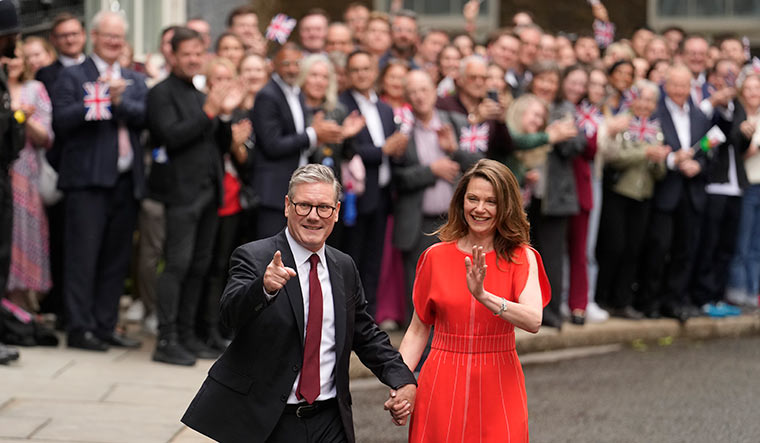Sometimes, small changes herald big revolutions. The makeover of a black-and-white tiled Edwardian toilet proclaimed a momentous transformation in Britain. The urinal was removed and feminine hygiene products were placed in the private toilet of the incoming chancellor (finance minister) in Whitehall, Britain’s seat of power. Prime Minister Sir Keir Starmer appointed Rachel Reeves his chancellor, making her the first woman in the post since the office was created 800 years ago.
Starmer’s cabinet is as historic as his landslide with the Labour Party winning 412 seats in the 650-member parliament. Yet he struck a humble but significant note: “Public service is a privilege. Self-interest is yesterday’s politics.”
Starmer’s decisions are based on data and evidence. He appointed Patrick Vallance, nicknamed “Dr Doom” for his dire warnings during Covid, as his science minister. “Keir practises politics exactly the way he practises law,” said Lord Ken Macdonald, Starmer’s predecessor as director of public prosecution. “Process matters. There are no fireworks, but he won cases with quiet persuasiveness, command of facts and attention to detail.”
Starmer is interested in fixing problems, not winning TV ratings. Rising crime was a huge election issue. British prisons are so overcrowded that authorities are releasing prisoners who should be in jail. Starmer appointed James Timpson, the owner of a key-cutting and shoe-repairing firm, as the new prisons minister. Timpson’s firm employs former convicts since 2008, re-training them with skills useful for society.
Starmer inducted experienced Labour ministers from the past to run the education and business ministries. He also appointed many first-timers who grew up in poor households. Labour luminary Jonathan Ashworth said it was the most working-class cabinet of all time. Starmer himself grew up in a working class family. His father was an undemonstrative factory toolmaker, his mother a bedridden nurse and their home phone was once disconnected because of unpaid bills. But Starmer studied his way into Oxford.
Deputy Prime Minister Angela Rayner grew up in government housing, left school with no qualifications and became pregnant at 16. Foreign Secretary David Lammy’s ancestors were slaves. Education Secretary Bridget Phillipson was bullied in school for being poor and was brought up on government benefit allowances by her single mother. Health Secretary Wes Streeting is the gay son of a single mom, whose grandfather was a convicted robber and grandmother jailed for assorted crimes. He went on to graduate from Cambridge.
Critics say Starmer lacks vision. They see his flip flops as unprincipled and opportunistic. Arguably, this “flaw” could be self-designed to give himself manoeuvrability when difficult choices must be made. His decisions are pragmatic, not ideological. In his first address from 10 Downing Street, Starmer said his prime ministership would be “unburdened by doctrine”.
Unsurprisingly, Starmer quickly reversed Labour’s long-standing policy on Kashmir. By referring to Kashmir as a bilateral issue between India and Pakistan and stressing that India’s constitutional issues should be decided by the Indian Parliament, Starmer opened gateways of friendship with the India lobby in the UK and pathways to optimise business potential with New Delhi. On foreign policy, British governments maintain continuity, though Starmer must repair relations with allies, including Europe.
Starmer is a man of contradictions: an anti-monarchist knighted by the queen, a one-time editor of a Trotskyite magazine who now talks like a Tory about wealth creation. “I always found him extraordinarily rational,” said Dominic Grieve, the former Conservative attorney general. Starmer devoted his legal career to fight for the rights of abused women in Britain and political prisoners in Northern Ireland and he supported environmental activists in their fight against McDonald’s. As prosecutor, he pressed charges against both Tory and Labour politicians for misusing expenses, oversaw the first British prosecution of Al Qaeda terrorists and saved 400 innocent prisoners from death sentence in Uganda, which he calls his biggest achievement. His activism earned him the nickname “lefty lawyer”.
Starmer is a public figure, but a privacy-conscious citizen and a committed family man. His wife Victoria is a nurse, his cat’s name is JoJo, but his children’s names are not public. He is an atheist, while his wife is Jewish, and the family observes the sabbath supper every week. Grounded and serious, Starmer is a good listener, prone to contemplation. As election results poured in, aides caught him gazing out of his window into the garden, deep in thought, watching children play. When he won, triumphalism and flamboyance were singularly absent.
Starmer appears stodgy, but he defended―and won―the rights of a British oddball to visit the Stonehenge heritage site during the summer solstice. The rational Starmer knew ex-biker Arthur Pendragon’s claim to be a “Druid”― descended from the mythical king Arthur―was absurd. But good lawyers believe in upholding every citizen’s right to legal defence.
“He was always looking 10 miles down the road at how a seemingly unwinnable case could be won on appeal to the Supreme Court or the European Court of Human Rights,” said lawyer Mark Stephens, one of Starmer’s former colleagues. He took steps towards his goal methodically. Said his friend, Baroness Jenny Chapman, “Keir seeks power for purpose. He is the kind of person who only wants to do a job if he can deliver.”
 Unsafe haven: Migrants brought ashore in Dungeness, Kent, after being rescued at sea | Shutterstock
Unsafe haven: Migrants brought ashore in Dungeness, Kent, after being rescued at sea | Shutterstock
Starmer joined politics nine years ago, at age 52, unlike the elite Oxford Union debaters who, from birth, are ordained for politics. Working-class Starmer had to break barriers, but he was ambitious and determined. “He is very, very driven, and quite relentless,” observed Tom Baldwin, his biographer.
Starmer took over Labour after its 2019 election debacle, promising change. He delivered, using the lawyer’s fact-based, ideology-excised methodology. Setting his eyes on winning the 2024 elections, Starmer systematically and ruthlessly eliminated rivals from the party. He did not spare toxic demagogues, activists, anti-Semites and radical leftists, including his deputy Jessica Long-Bailey and former party leader Jeremy Corbyn.
It worked. Labour became acceptable again. “Keir took all the left out of the Labour Party. He has come with a brilliant set of values, principles and ways of growing Britain in complete alignment with my views as a commercial capitalist,” said billionaire businessman John Caudwell, previously a big Tory donor. “Steely Starmer” achieved change without an upheaval.
Now Starmer promises to change Britain. He will need much luck and ruthlessness to do that after 14 years of Tory governments. The economic mess is shocking: the worst decline in living standards since the 1950s; lowest wage growth in peace time since the Napoleonic wars; lowest productivity since 1826; and public debt at 90 per cent of the GDP. Bankrupted local councils have resulted in uncollected garbage, closed libraries and squeezed medicare.
Social divisions, inequality between people and regions, institutional decay and increasing elderly and child poverty are alarming. One study found half the British population is poorer than people living in poorer parts of Europe and the US. While bankers, lawyers and consultants thrived, significant classes of the population, such as farmers, workers, teachers, doctors and ordinary consumers are suffering from a severe cost of living crisis. Said outgoing Tory minister Robert Jenrick, “We didn’t have a good enough diagnosis of just how broken our public services were.” “Richie Rich” Tory prime minister Rishi Sunak was doomed by the widespread perception that he was “out of touch”.
Brexit, Tory scandals and economic meltdowns have scarred and scared the nation against the Tories. “The party that has dominated Britain for 200 years has imploded,” said Irish scholar Fintan O’Toole, who teaches at Princeton University. Swooping like a vulture over the Tory near-carcass is Reform Party’s Nigel Farage, the “father of Brexit”. His party won 14 per cent of the votes, but only five seats. The far-right leader seems ready to stage a MAGA-style takeover of the Tory party. The rise of Reform, Greens and Liberal Democrats reveal the fragmentation of the British electorate.
Given voter anxieties, Starmer’s priority is revitalising public services like state hospitals, schools and welfare. He must fix the housing mess; reduce legal and illegal migration, which people blame for job losses and housing shortages; settle strikes to kickstart the nation; decarbonise electricity to mitigate climate change that is causing intense and frequent floods and heatwaves; fix the drainage system (privatised by Margaret Thatcher) that shamed the nation by emptying untreated sewage into rivers and ponds. The list is long.
In addition to his ministers, Starmer also has two “weapons of mass traction” to tackle these challenges. Sue Gray, his seasoned chief of staff and former civil servant, has prepared a dossier for immediately addressing the problems. And there is the “data-nerd” and campaign manager, Morgan McSweeney, who has already started a data-heavy review of the party’s election performance to find pathways to win the next election in 2029.
Starmer plans to shepherd a “decade of renewal”. Government oversight will be back on issues ranging from political ethics to housing, football to brushing teeth―experts complain that the state of children’s teeth is “appalling”. Starmer is an uncharismatic leader, but he is an efficient manager. He converted Labour’s spectacular defeat in 2019 to a landslide in 2024. Labour’s vote share increased by only 1.5 per cent, but it bagged an extra 210 seats.
“Keir has the workaholism of Harold Wilson, the intense seriousness of Clement Attlee and the qualities associated with that great liberal reformer, William Gladstone,” said lawyer Geoffrey Robertson, who gave Starmer his first job, comparing him with stalwart prime ministers. “That should terrify the Tories.”



